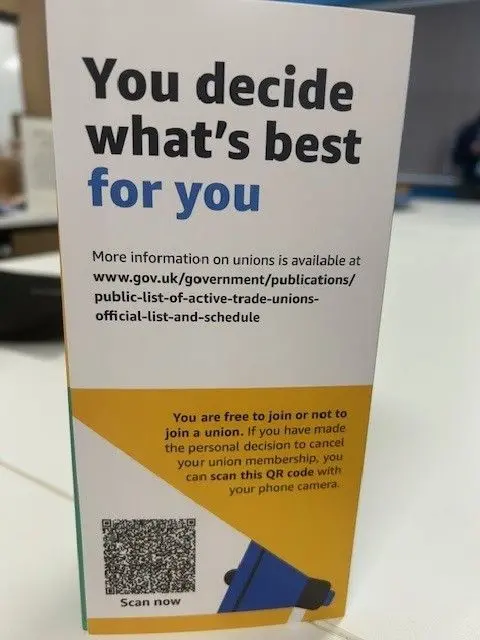The GMB has narrowly lost its historic bid for union recognition at the Amazon warehouse in Coventry.
Some 49.5% of workers balloted voted in favour, while 50.5% voted against.
The union needed a majority to vote in favour.
If the GMB had won it would have been the first time Amazon recognised a union in the UK.
The online giant would have been forced to negotiate with workers on issues such as pay and conditions.
In a statement, Amazon said it placed “enormous value on engaging directly” with staff.
“We look forward to continuing on that path with our team in Coventry,” it added.
The GMB told the BBC it is considering trying again to get recognition at the Coventry site and that discussions are taking place about its strategy.
The process would include persuading the Central Arbitration Committee, which is in charge of overseeing applications for recognition, that the pool of workers eligible to vote had increased.
‘Union busting’
The GMB, which claimed it lost by 28 votes, said its drive for recognition fell “agonisingly short” and accused Amazon of “union-busting”.
It said there were “anti-union messages by company bosses, including multiple anti-union seminars” at the warehouse.
It added that “the fire lit by workers in Coventry and across the UK is still burning”, and that the union would “carry on the fight” for low paid workers.
The union’s fight for recognition had been described as a David vs Goliath battle, with workers facing fierce resistance from the online giant.
It began with a rag tag show of defiance in the summer of 2022, after Amazon offered workers a pay rise of between 35p and 50p an hour.
Having toiled in warehouses during the Covid pandemic, workers said this felt like an insult, and in Coventry a small group of angry workers spontaneously walked out and protested outside the fulfilment centre.
Then the GMB got involved and urged the workforce to unionise.
In January 2023, with a GMB membership of just 50, Coventry workers held the first ever Amazon strike in the UK.
It went on to organise a further 37 days of industrial action over the last year and by recruiting on the picket line, steadily built up its membership to more than 1,400 members out of the centre’s estimated 3,000 plus workers.
In April the union launched a legal challenge against Amazon, claiming it used underhand tactics to encourage members to cancel their union membership.
On Wednesday it said that legal challenge would continue.
As part of the challenge, the GMB says Amazon put up posters in fulfilment centres featuring QR codes that generated an email to the union’s membership department requesting that their membership be cancelled.
Amazon responded saying that “employees were telling us they wanted to cancel their membership but could not find a way to do so, so we provided information to help.
“We have always been clear, that union membership is an employee’s personal choice.”

Amazon, which is one of the UK’s largest private sector employers, with 75,000 workers, made it clear all along that it did not want to recognise a union and that it wanted to retain direct communication with its staff.
After the vote on Wednesday, it further reiterated that “having daily conversations” with staff was “an essential part of our work culture”.
“We value that direct relationship and so do our employees.
This is why we’ve always worked hard to listen to them, act on their feedback, and invest heavily in great pay, benefits and skills development,” the firm added.
The GMB says it is surprised by what it sees as the fearlessness of an overwhelmingly immigrant workforce, many of whom arrived recently from South Asia.
Union organisers estimate that as little as 5% of the Coventry employees are British born and its campaign leaflets were translated into 12 different languages.
They say that in the beginning many were frightened to get involved but as the strikes wore on, and people saw that workers who’d joined picket lines weren’t facing disciplinary action, their confidence grew.
The result could dash unions’ hopes that the new Labour government will strengthen their power to organise.
Labour has promised to make it easier for unions to win recognition ballots by lowering the required threshold for victory and to make it easier for union officials to recruit in workplaces.
The general secretary of the Trades Union Congress, Paul Nowak, said that despite taking on one of the “world’s largest corporate giants”, the Coventry union members “only narrowly missed out” on securing recognition.
“With Labour set to usher in a new era of stronger workers’ rights, companies like Amazon are on the wrong side of history,” he added.
But Gregor Gall, a professor of industrial relations at Glasgow university, questioned whether GMB had the resources to take the fight to other Amazon centres.
“The cost of union organising is very high.
The GMB had officers working full time on it.
We won’t necessarily see organising drives elsewhere,” he said.
Professor Gall’s caution is understandable considering what has happened in the United States.
In 2022 Amazon workers at its Staten Island warehouse in New York became the first in the US to win union recognition.
Two years on, the company has still not sat down to negotiate with the union and continues to fight legal challenges to the vote.

